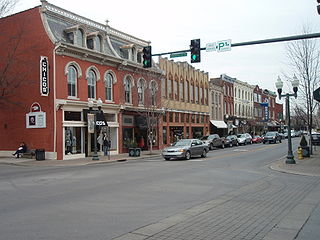
The Mallory–Neely House is a historic residence on 652 Adams Avenue in Memphis, Tennessee, USA. It is located in the Victorian Village district of Memphis. It has been identified as one of numerous contributing properties in the historic district.

Barrs Chapel C.M.E. Church is a historic district at 5560 Briarpatch Lake Road in the Midway community of Henry County, Tennessee.

Smithson–McCall Farm is a 256.3-acre (103.7 ha) historic district in Bethesda, Tennessee. The farm was listed under the National Register of Historic Places in 2007. The listing claims that the property "documents the impact of the progressive agricultural movement of the early twentieth century on the operations and landscape of a middle-class family farm," and includes an "architecturally significant group of buildings and structures, placed within an agricultural landscape of high integrity...that represents a good example of farmstead architecture in Middle Tennessee and that reflects the impact of the Progressive Farm movement of the early twentieth century".

The Bostick Female Academy, also known as Triune School, is a property in Triune, Tennessee that was listed on the National Register of Historic Places in 1982.

The Boyd–Wilson Farm is a 157-acre (64 ha) historic district in Franklin, Tennessee, United States. The circa 1840 farm includes an I-house.

The Maney-Sidway House, also known as Jasmine Grove and as Myles Manor, is a building in Franklin, Tennessee originally built c.1836, that was listed on the National Register of Historic Places in 1988.

The Owen-Primm House was originally a log cabin built by Jabez Owen c. 1806, and later expanded with wood framing by Thomas Perkins Primm c. 1845. This property in Brentwood, Tennessee was listed on the National Register of Historic Places in 1988.

Hincheyville Historic District is a 53-acre (21 ha) historic district in Franklin, Tennessee. It is one of seven local historic districts in Franklin and was listed on the National Register of Historic Places in 1982, with boundary revisions in 2020.

The Nicholas Tate Perkins House is a property in Franklin, Tennessee, United States, that was listed on the National Register of Historic Places in 1988. The property is also known as Two Rivers. It was built or has other significance as of c.1820. It includes Central passage plan and other architecture. When listed the property included two contributing buildings and one non-contributing structure, on an area of 3.4 acres (1.4 ha). The property was covered in a 1988 study of Williamson County historical resources.
Henry Pointer House is a building in Thompsons Station, Tennessee that was listed on the National Register of Historic Places. It was removed from the National Register in 2006.

The John Pope House, also known as Eastview, is a historic house in Burwood, Williamson County, Tennessee. It incorporates hall-parlor plan architecture and single pen architecture.

The Jordan–Williams House is an Italianate style house in Nolensville, Tennessee that was listed on the National Register of Historic Places in 1988.

The Franklin Hardeman House is a property in Franklin, Tennessee that was listed on the National Register of Historic Places in 1988. The property is also known as Sugar Hill and is denoted as Williamson County historic resource WM-291.

The Robert Hodge House, also known as Sullivan Farm House, is a ca. 1900 Queen Anne and Colonial Revival house in Franklin, Tennessee.

Franklin Historic District is a historic district in Franklin, Tennessee that was listed on the National Register of Historic Places in 1972. It was created to preserve historic commercial and residential architecture in a 16-block area of the original, downtown Franklin around the north, west, and south of the town square.

The Samuel B. Lee House, also known as Maplewood, is a house in Duplex, in the U.S. state of Tennessee that was listed on the National Register of Historic Places in 1988. The listed area was increased from 72 to 398 acres and the property listing name was changed to Maplewood Farm 1993.

The Samuel S. Morton House is a property in Franklin, Tennessee that was listed on the National Register of Historic Places in 1988. It has also been known as Lillie House.

The Sparkman–Skelley Farm is a property in Boston, Tennessee that was listed on the National Register of Historic Places in 2000. It has also been known as Sparkman Farm and as Skelley Farm. It dates from c.1846.

The John Frost House is a property in Brentwood, Tennessee, United States, that was listed on the National Register of Historic Places in 1988. It has also been known as Cottonport, and dates from c.1810.

Harlinsdale Farm is a 198-acre (80 ha) historic district in Franklin, Tennessee that was listed on the National Register of Historic Places in 2006. It dates from c.1900 and had other significant dates in 1935 and 1945.












